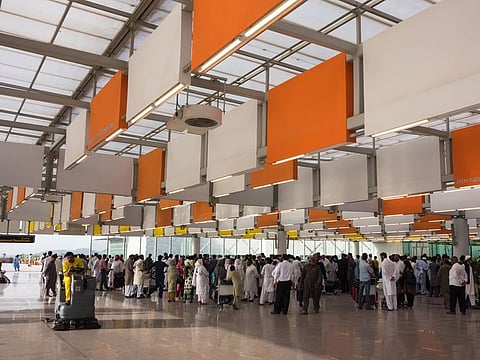Eid Al Adha 2022: Airfares on UAE-Pakistan routes this Eid climb to Dh3000 - and even up to Dh8,000
PIA still has tickets at around Dh2000 as demand hits peak levels

Dubai: Pakistani expats in the UAE flying back to the home country for this week’s Eid holidays are seeing ticket rates climb as high as even Dh8,000 for one way on some flights.
A flight from Dubai to Karachi costs around Dh1,000-Dh2,000 on most carriers, while Emirates’ rates are over Dh3,000. Lahore, which has fewer direct flight connections from Dubai, is seeing similar airfares, while Pakistan International Airlines (PIA) is charging Dh1,800-Dh2,000.
While It’s standard practice for fares to rise during the busiest summer travel phase, it’s even higher this time on the UAE-Pakistan sector. “Most Economy seats are sold out and only the higher priced options are available now,” said an agent at South Travels DMCC. “There will be some respite by the end of the month, but a full return to normal fares will only happen by September end.”
flydubai - which operates flights to Faisalabad, Karachi, Multan, Quetta, and Sialkot - said its services to the country have returned to pre-pandemic levels. “Pakistan is an important market for flydubai, with a combined frequency of 75 weekly flights,” said a spokesperson.
Come end of this month, most flights will be available in the Dh300-Dh800 range one-way as more airlines bring capacity to full. In the last week of September, average fares will fall further, with most airlines charging around Dh360.
Meanwhile, PIA has been gradually building out its network as demand returns. The flagship carrier has announced that it will operate flights connecting Karachi and Lahore to Doha from July onwards.
PIA, which resumed its Kuala Lumpur route last month, has also launched direct flights to Baku (Azerbaijan) for the first time.
But Business will cost more
First and Business class travel to Pakistan has become more expensive following imposition of taxes on luxury services by the government. According to a government notification, the Federal Excise Duty (FDA) has been increased from Rs10,000 (Dh180) to 50,000 (Dh900) on all First and Business class tickets with effect from July 1.
But this will not have any impact on demand as the premium seating options are booked by corporates and the wealthy. Companies often book Business or First class seats in bulk and that boosts profitability for airlines. The government is trying to tax these big transactions, said Fahad Masood, an aviation analyst.
“The challenge being faced under the global economic crisis is generating funds and at a time when the economy is in a tailspin,” said Masood. “They need to find ways and means to generate more for the exchequer.”
Around half of Pakistan’s travel market is for Umrah and Hajj and this is followed by the Middle East bound traffic. Business travel only comes a distant third right now.
One of the busiest routes from Dubai
According to Flightradar24, Karachi is the eighth busiest route from Dubai with 58 flights per week, right behind Muscat with 70. In 2021, Pakistan was the No. 2 destination from Dubai International (DXB) with 1.8 million passengers after India.
Sign up for the Daily Briefing
Get the latest news and updates straight to your inbox







